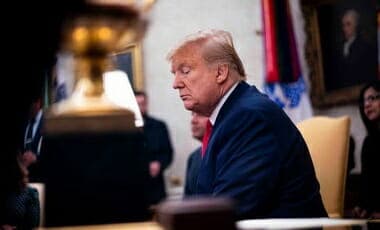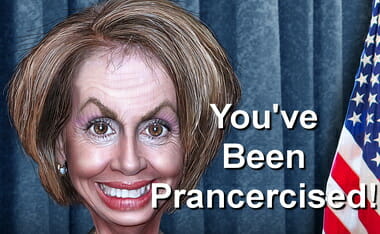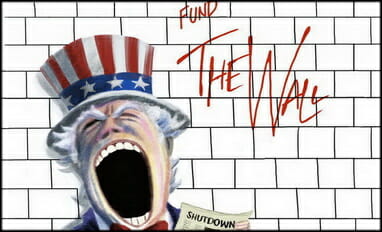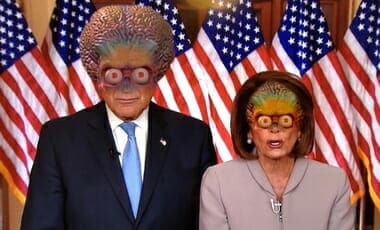Hugh Hewitt took the time to read the entire letter from President Trump to Speaker Nancy Pelosi. (If you wish, the entire letter is below for your reading pleasure)
Letter From President Trump… by charliespiering on Scribd

Hugh Hewitt took the time to read the entire letter from President Trump to Speaker Nancy Pelosi. (If you wish, the entire letter is below for your reading pleasure)
Letter From President Trump… by charliespiering on Scribd

Rush made some excellent analysis of the Democrats today… but I needed to make this consumable (short). So here are two separate points joined together to show this will not end when he wins in 2020 — and that this has been in the works (impeachment) since 2016.

In the fight between left vs right, Democrats vs Republicans, progressives vs conservatives, the sides are clear. The motives are clear. One side will say what they believe helps them the most and hurts their opponents at the same time. It may be ugly, but it’s honest (at least in their intentions if not in substance).
On Tuesday, Representative Devin Nunes (R-CA) laid out the Republican case against impeachment in his opening statement as the ranking member of the House Intelligence Committee. In his statement, he did as most expected and attacked the Democrats’ case, but the real meat and potatoes from his statement came in the form of attacks against mainstream media. (NOQ REPORT)
Rep. John Ratcliffe, notes that Democrats have called Trump’s conduct “bribery” and then pulls out a mountain of papers of deposition transcripts. He says at no point have witnesses described his conduct as “bribery” in the last six weeks. He says the word appears only once — and that’s in relation to former Vice President Joe Biden’s alleged conduct.
LEGAL INSURRECTION — Rep Elise Stefanik!
OTHER VIDEOS
Here’s a few notable clips from this evening’s hearing, the first of which is both Tim Morrison and Kurt Volker agreeing that Zelensky had no idea that the Ukraine ad was being held up at the time of the July 25th phone call…
Volker also testified that there was no quid pro quo or ‘bribery’, as they are now calling it:
And finally, Morrison, who was listening in on the July 25th phone call between Trump and Zelensky says nothing concerned him about the call:
Yet again, Chairman Adam Schiff blocks questions from Republicans, refusing to allow @Jim_Jordan to inquire about one of the two individuals Vindman read out about the July 25 call.
If Schiff doesn’t know who the “whistleblower” is, why is he objecting to this question? pic.twitter.com/J7E6wBRI8l
— Rep Andy Biggs (@RepAndyBiggsAZ) November 19, 2019

The issue mentioned below about calling witnesses (supoena power by Republicans) is not granted under Pelosi’s resolution. So NOT like the majority offered rights to the minority during Nixon and during Clinton. Here is another example of Schiff’s almost Soviet style circus show. Rep. Jim Jordan is now telling us that Adam Schiff is blocking the witness from answering specific questions from Republicans (RIGHT SCOOP):
NEW: Rep. Jim Jordan says Adam Schiff has blocked Republican questions that could lead to the unmasking of the whistleblower. pic.twitter.com/QBk3xxXNKi
— Zach Purser Brown (@zachjourno) October 29, 2019
(Some more disparities are pointed out in a PREVIOUS POST)
PJ-MEDIA opines rightly:
After showing some TWEETS by Sean Davis and Byron York, RED STATE sums up the resolution by Nancy Pelosi well:
Someone point out to me how this changes anything. The chair is Adam Schiff. The resolution gives him sole authority to release transcripts. All this does is legitimize his selective leaking. Now he can release excerpts as he sees fit without having to shovel them through CNN. If a testimony helps Donald Trump, he can simply hold it back and no doubt he will (I have a story tomorrow coming about Schiff instructing witnesses not to answer the questions of Republican members).
But maybe he’s giving subpoena power to the minority party like Republicans did during the Clinton impeachment investigation? Nope. Adam Schiff once again garners full authority to veto any requested witnesses or subpoenas and the only appeal is to the entire committee, which is majority Democrat and will always vote to back up Schiff. Again, nothing has changed.
Nearly every single anti-transparency dynamic Republicans have pointed out still exists, just with prettier language around it. This resolution is window dressing. It’s an attempt to shovel fodder to the media, knowing they will now proclaim all Republican concerns moot. The fact that some conservatives are going along with the gambit is disappointing.
Republicans aren’t asking for a lot. We simply want to see the transcripts. We want to be able to judge the contradictions, context, and any possible evidence for ourselves. Adam Schiff being the arbiter of that is not acceptable and as long as that dynamic exists, this inquiry will continue to be a sham.
Democrats should be watching the polling of Independents.

And this is the million-dollar question, answered by Rep. Chaffetz… House Speaker Pelosi does not want to give subpoena power to House Republicans, says Fox News contributor Jason Chaffetz, former chairman of the House Oversight and Reform Committee.

HUGH HEWITT reads Kimberly Strassel’s column, earlier today:
A little POWRLINE intro please: The Democrats’ hysteria over Attorney General William Barr is directly proportional to their fear of the damage they fear he might do, Kim Strassel explains in her Wall Street Journal Potomac Watch column HERE:
The only thing uglier than an angry Washington is a fearful Washington. And fear is what’s driving this week’s blitzkrieg of Attorney General William Barr.
Mr. Barr tolerantly sat through hours of Democratic insults at a Senate Judiciary Committee hearing Wednesday. His reward for his patience was to be labeled, in the space of a news cycle, a lawbreaking, dishonest, obstructing hack. Speaker Nancy Pelosi publicly accused Mr. Barr of lying to Congress, which, she added, is “considered a crime.” House Judiciary Committee Chairman Jerrold Nadler said he will move to hold Mr. Barr in contempt unless the attorney general acquiesces to the unprecedented demand that he submit to cross-examination by committee staff attorneys. James Comey, former director of the Federal Bureau of Investigation, lamented that Donald Trump had “eaten” Mr. Barr’s “soul.” Massachusetts Sen. Elizabeth Warren demands the attorney general resign. California Rep. Eric Swalwell wants him impeached.
These attacks aren’t about special counsel Robert Mueller, his report or even the surreal debate over Mr. Barr’s first letter describing the report. The attorney general delivered the transparency Democrats demanded: He quickly released a lightly redacted report, which portrayed the president in a negative light. What do Democrats have to object to?
Some of this is frustration. Democrats foolishly invested two years of political capital in the idea that Mr. Mueller would prove President Trump had colluded with Russia, and Mr. Mueller left them empty-handed. Some of it is personal. Democrats resent that Mr. Barr won’t cower or apologize for doing his job. Some is bitterness that Mr. Barr is performing like a real attorney general, making the call against obstruction-of-justice charges rather than sitting back and letting Democrats have their fun with Mr. Mueller’s obstruction innuendo.
But most of it is likely fear. Mr. Barr made real news in that Senate hearing, and while the press didn’t notice, Democrats did. The attorney general said he’d already assigned people at the Justice Department to assist his investigation of the origins of the Trump-Russia probe. He said his review would be far-reaching—that he was obtaining details from congressional investigations, from the ongoing probe by the department’s inspector general, Michael Horowitz, and even from Mr. Mueller’s work. Mr. Barr said the investigation wouldn’t focus only on the fall 2016 justifications for secret surveillance warrants against Trump team members but would go back months earlier.
He also said he’d focus on the infamous “dossier” concocted by opposition-research firm Fusion GPS and British former spy Christopher Steele, on which the FBI relied so heavily in its probe. Mr. Barr acknowledged his concern that the dossier itself could be Russian disinformation, a possibility he described as not “entirely speculative.” He also revealed that the department has “multiple criminal leak investigations under way” into the disclosure of classified details about the Trump-Russia investigation.
Do not underestimate how many powerful people in Washington have something to lose from Mr. Barr’s probe. Among them: Former and current leaders of the law-enforcement and intelligence communities. The Democratic Party pooh-bahs who paid a foreign national (Mr. Steele) to collect information from Russians and deliver it to the FBI. The government officials who misused their positions to target a presidential campaign. The leakers. The media. More than reputations are at risk. Revelations could lead to lawsuits, formal disciplinary actions, lost jobs, even criminal prosecution.
The attacks on Mr. Barr are first and foremost an effort to force him out, to prevent this information from coming to light until Democrats can retake the White House in 2020. As a fallback, the coordinated campaign works as a pre-emptive smear, diminishing the credibility of his ultimate findings by priming the public to view him as a partisan.
That’s why Mr. Barr isn’t alone in getting slimed. Natasha Bertrand at Politico last month penned a hit piece on the respected Mr. Horowitz. It’s clear the inspector general is asking the right questions. The Politico article acknowledges he’s homing in on Mr. Steele’s “credibility” and the dossier’s “veracity”—then goes on to provide a defense of Mr. Steele and his dossier, while quoting unnamed sources who deride the “quality” of the Horowitz probe, and (hilariously) claim the long-tenured inspector general is not “well-versed” in core Justice Department functions.
“We have to stop using the criminal-justice process as a political weapon,” Mr. Barr said Wednesday. The line didn’t get much notice, but that worthy goal increasingly looks to be a reason Mr. Barr accepted this unpleasant job. Stopping this abuse requires understanding how it started. The liberal establishment, including journalists friendly with it, doesn’t want that to happen, and so has made it a mission to destroy Mr. Barr. The attorney general seems to know what he’s up against, and remains undeterred. That’s the sort of steely will necessary to right the ship at the Justice Department and the FBI.

Nancy Pelosi is a goof. This is what she said:
“Let’s talk about today: The one-year anniversary of another manifestation of the epidemic of gun violence in America,” Pelosi said. “That’s a national emergency. Why don’t you declare that emergency, Mr. President? I wish you would.
“But a Democratic president can do that.”
(THE HILL)
No, no he or she cannot do that Mrs. Pelosi.
Article II, Section 3 of the Constitution requires the President to “take Care that the Laws be faithfully executed.” This clause, known as the Take Care Clause, requires the President to enforce all constitutionally valid Acts of Congress, regardless of his own Administration’s view of their wisdom or policy. The clause imposes a duty on the President; it does not confer a discretionary power. The Take Care Clause is a limit on the Vesting Clause’s grant to the President of “the executive power.”
The United States Court of Appeals for the D.C. Circuit, in an opinion handed down just last year striking down the President’s assertion of authority to disregard a federal statute, provided a succinct description of the President’s obligations under the Take Care Clause, as follows:
Under Article II of the Constitution and relevant Supreme Court precedents, the President must follow statutory mandates so long as there is appropriated money available and the President has no constitutional objection to the statute. So, too, the President must abide by statutory prohibitions unless the President has a CONSTITUTIONAL OBJECTION to the prohibition. If the President has a constitutional objection to a statutory mandate or prohibition, the President may decline to follow the law unless and until a final Court order dictates otherwise. But the President may not decline to follow a statutory mandate or prohibition simply because of policy objections. Of course, if Congress appropriates no money for a statutorily mandated program, the Executive obviously cannot move forward. But absent a lack of funds or a claim of unconstitutionality that has not been rejected by final Court order, the Executive must abide by statutory mandates and prohibitions.
There is both a positive and negative aspect to this part of the Constitution. In other words, a President cannot declare an emergency that violates the 2nd Amendment. (I can’t believe a high school drop out 3-time felon has to point that out to the Speaker of the House.)

Mind you, this from a woman that thinks MOWING GRASS is better than building walls, and now just BUILD BETTER ROADS to facilitate more immigration. In other words, lawnmowers are out:

(MOONBATTERY h-t) The Democrat talking points that the urgently needed wall would be ineffective, immoral, unnecessary, and excessively expensive do not pass the laugh test.
(Ann Coulter) …The Democrats’ latest idea is to call a wall “immoral, ineffective and expensive.”
If they think a wall is “immoral,” then they’re admitting it’s effective. An ineffective wall would merely be a place for illegals to stop and get a little shade before continuing their march into the United States….
President Obama, thank you for your great support – I have been saying this all along! pic.twitter.com/L506g9Aq4z
— Donald J. Trump (@realDonaldTrump) January 10, 2019
BTW, just so Jim Acosta knows… an hour away from the video Acosta made, in an unwalled border town in the rio grande valley, a pile of dead bodies was found (BIG LEAGUE POLITICS)

It’s so widely accepted that Democrat leadership had a terrible response to President Donald Trump’s Oval Office address Tuesday night that even left-wing political commentators are making fun of it.
After Trump’s impassioned, articulate speech on border security, House Speaker Nancy Pelosi and Senate Minority Leader Chuck Schumer responded with their own address.
However, virtually nobody is talking about what Pelosi and Schumer said in their response — which was standard Democratic pablum. Everybody is focused on their ridiculous appearance……


Michael Medved responds to the food stamp issue that Democrats and the Left are bringing up. I take a clip from yesterday’s show and insert it into the middle of today’s show to give the listener some ammunition when these banal arguments come up. At the 5:17 mark, the caller mentions taxes for the millionaires as part of his argument. Medved Responds well to this challenge at the… and at the 6:24 mark you hear the caller respond with a bumper sticker jingle. In other words, talking about facts matters little to these people, but at least you will be able to influence those around you eavesdropping in on the conversation.
I posted this video on LIVELEAK, and a comment got me “clicking around” the internet to test what the person said. Here is the comment:
For every $1 spent on food stamps there’s a $1.80 stimulative effect to the economy. The poor person spends the funds at the grocery store, which allows the store to employ more people, the store spends the funds to buy more food which helps farmers and food producers. On the other hand, tax cuts for the wealthy have a negative effect on the economy, it just doesn’t trickle down enough so it drains economic growth. Plus it helps feed poor people that can’t afford to eat. — Warren H.
First, it should be noted that this idea was championed mainly by Moody’s chief economist Mark Zandi, a hard-core Keynesian. However, it should be noted that unfortunately “for Zandi, there has never been any empirical evidence of the Keynesian multiplier. Government doesn’t take one dollar and turn it into more by spending it. God doesn’t live in the White House, no matter how much Paul Krugman prays.” (AMERICAN THINKER)
HERITAGE FOUNDATION puts it like this:
…The Keynesian argument also assumes that consumption spending adds to immediate economic growth while savings do not. By this reasoning, unemployment benefits, food stamps, and low-income tax rebates are among the most effective stimulus policies because of their likelihood to be consumed rather than saved.
Taking this analysis to its logical extreme, Mark Zandi of Economy.com has boiled down the government’s influence on America’s broad and diverse $14 trillion economy into a simple menu of stimulus policy options, whereby Congress can decide how much economic growth it wants and then pull the appropriate levers. Zandi asserts that for each dollar of new government spending: temporary food stamps adds $1.73 to the economy, extended unemployment benefits adds $1.63, increased infrastructure spending adds $1.59, and aid to state and local governments adds $1.38. Jointly, these figures imply that, in a recession, a typical dollar in new deficit spending expands the economy by roughly $1.50. Over the past 40 years, this idea of government spending as stimulus has fallen out of favor among many economists. As this paper shows, it is contradicted both by empirical data and economic logic…
They then respond to the above:
The Evidence is In
Economic data contradict Keynesian stimulus theory. If deficits represented “new dollars” in the economy, the record $1.2 trillion in FY 2009 deficit spending that began in October 2008–well before the stimulus added $200 billion more–would have already overheated the economy. Yet despite the historic 7 percent increase in GDP deficit spending over the previous year, the economy shrank by 2.3 percent in FY 2009. To argue that deficits represent new money injected into the economy is to argue that the economy would have contracted by 9.3 percent without this “infusion” of added deficit spending (or even more, given the Keynesian multiplier effect that was supposed to further boost the impact). That is simply not plausible, and few if any economists have claimed otherwise.
And if the original $1.2 trillion in deficit spending failed to slow the economy’s slide, there was no reason to believe that adding $200 billion more in 2009 deficit spending from the stimulus bill would suddenly do the trick. Proponents of yet another stimulus should answer the following questions: (1) If nearly $1.4 trillion budget deficits are not enough stimulus, how much is enough? (2) If Keynesian stimulus repeatedly fails, why still rely on the theory?
This is no longer a theoretical exercise. The idea that increased deficit spending can cure recessions has been tested repeatedly, and it has failed repeatedly. The economic models that assert that every $1 of deficit spending grows the economy by $1.50 cannot explain why $1.4 trillion in deficit spending did not create a $2.1 trillion explosion of new economic activity.
CATO likewise notes that the numbers were fudged to provide exaggerated outcomes:
Food stamps are effective economic stimulus. Led by Mark Zandi and other Keynesian economists, food-stamp advocates have made wildly exaggerated claims about the program’s role in stimulating the economy. Zandi, for instance, claims that “extending food stamps is the most effective way to prime the economy’s pump.”
But aside from the fact that those economic models just as well predict an alien invasion would be a boon to the economy, there is little evidence to support the theory. Even the Agriculture Department’s own inspector general concluded that it was unable to determine whether the additional dollars in the stimulus’s food-stamp expansion were in any way effective in meeting the 2009 Recovery Act’s goals. Three of the four performance measures the program was supposed to use, the office found, “reflected outputs, such as the dollar amount of benefits issued and administrative costs expended” and did not provide any insight into outcomes.
On the other hand, we do know that a failure to get government spending under control will have long-term economic consequences. Food stamps are hardly the major cause of deficits and debt — that distinction lies with middle-class entitlements such as Social Security and Medicare — but every little bit helps.
Valerie Jarrett and Nancy Pelosi said similar things:
Again, similar responses happened then as well:
Economists at the Heritage Foundation have written about this claim, explaining:
The theory behind extending UI [Unemployment Insurance] benefits as a stimulus assumes that unemployed workers will immediately spend any additional UI payments, instantly increasing consumption, boosting aggregate demand, and stimulating the economy.
This is not a new idea. Economists in the 1960s thought that unemployment insurance could function as an important automatic economic stabilizer. Empirical research in the 1970s demonstrated that this was not the case, and studies since then have concluded that unemployment insurance plays at best a small role in stabilizing the economy. Empirical research at the state level also finds that UI plays a negligible role in stimulating the economy.
Studies that have found that UI stimulates the economy effectively — such as studies by the Congressional Budget Office and economist Mark Zandi — rely on two faulty assumptions, thereby drawing a false conclusion:
They assume that unemployed workers spend every dollar of additional UI benefits almost immediately and that extending unemployment insurance does not affect workers’ behavior. In that case, every dollar spent on unemployment insurance adds a dollar to consumption without any direct effects on the labor market. Both assumptions are false.
Unemployment Insurance Prolongs Unemployment. One of the most thoroughly established results in labor economics is the effect of unemployment benefits on unemployed workers’ behavior. labor economists agree that extended unemployment benefits cause workers to remain unemployed longer than they otherwise would.
This occurs for obvious reasons: Workers respond to incentives. Unemployment benefits reduce the incentive and the pressure to find a new job by making it less costly to remain without work…..